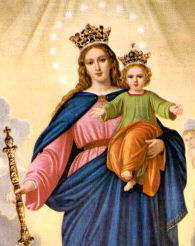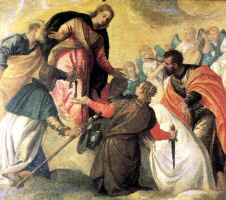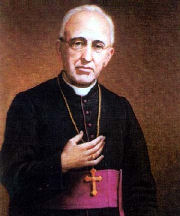
Daily Readings for:May 24, 2014
(Readings on USCCB website)
Collect: May your Spirit, O Lord, we pray, imbue us powerfully with spiritual gifts, that he may give us a mind pleasing to you and graciously conform us to your will. Through our Lord Jesus Christ, your Son, who lives and reigns with you in the unity of the Holy Spirit, one God, for ever and ever.
RECIPES
ACTIVITIES
o Marian Hymn: Beautiful, Glorious
PRAYERS
o Litany of the Blessed Virgin Mary (Litany of Loretto)
o Novena in Honor of Mary Help of Christians
o Table Blessing for the Feasts of the Mother of God
o Prayer to Our Lady of Sheshan
LIBRARY
o Our Lady, Help of Christians | John O'Connell
· Easter: May 24th
· Saturday of the Fifth Week of Easter: Australia: Solemnity of Mary Help of Christians; Bl. Louis-Zepherin Moreau (Canada)
Today the Church in Australia celebrates the Solemnity of Mary Help of Christians. Mary Help of Christians was adopted as patron of the new Church of Australia in 1844, at a significant time in their history. British settlement was just over fifty years old, the transportation of convicts was coming to an end, and the first elections in Australian history had been held in 1843. Issues of land, immigration and education had begun to surface and the Church was involved in these social problems. The Holy See confirmed the patronage in 1852.
The Canadian Church honors Bl. Louis-Zephirin Moreau today. He is the founder of the communities of the Sisters of Saint Joseph and the Sisters of Sainte Marthe. He also participated in the founding of numerous other institutions and pious works. He died on May 24, 1901.
Mary Help of Christians
As Mother of God's children, Mary has responded by helping Christians throughout the ages. She has done this by coming to the aid of individuals, families, towns, kingdoms and nations.
In 1214 she gave the Rosary to Saint Dominic as a weapon to combat the Albigesian heresy which was devastating Southern France. It is very clear to Christians and it is also the Will of God that we have and will continue to have the Help of Mary through the recitation of the Holy Rosary.
In the year 1531 Our Lady appeared in Mexico to an indian named Juan Diego. He was a humble peasant aged 51. As a result of the apparitions, over 10 million indians were converted to Catholicism, the sacrificial killings of babies stopped, and Our Lady left an image which is a reflection of herself imprinted miraculously on the tilma of Juan Diego.

In 1571 the whole of Christendom was saved by Mary Help of Christians when faithful Catholics throughout Europe prayed the Rosary. The great battle of Lepanto occurred on October 7th 1571. For this reason this date has been chosen as the feast of the Holy Rosary. In 1573 Pope Pius V instituted the feast in thanksgiving for the decisive victory of Christianity over Islamism.

Near the end of the 17th century, Emperor Leopold I of Austria took refuge in the Shrine of Mary Help of Christians at Pasau, when 200,000 Ottoman Turks besieged the capital city of Vienna. Pope Innocent XI united Christendom against the ominous attack of Mohammedanism. A great victory occurred thanks to Mary Help of Christians. On September 8th, Feast of Our Lady's Birthday, plans were drawn for the battle. On September 12, Feast of the Holy Name of Mary, Vienna was finally freed through the intercession of Mary Help of Christians. All Europe had joined with the Emperor crying out "Mary, Help!" and praying the Holy rosary.
In 1809, Napoleon's men entered the Vatican, arrested Pius VII and brought him in chains to Grenoble, and eventually Fontainbleau. His imprisonment lasted five years. The Pope smuggled out orders from prison for the whole of Christendom to pray to Our Lady Help of Christians, and thus the whole of Europe once again became a spiritual battle ground, not of arms against ruthless arms, but of Rosaries against ruthless military might. Soon Napoleon was off the throne and the Pope freed from prison.
After proving her maternal help, throughout the centuries, Our Lady has continued to appear in hundreds of places throughout the world mainly during the 20th century, Lourdes and Fatima being the most famous apparitions. She has brought help from Heaven, and has warned her children to do prayer and penance as a formula for peace. She has stressed that her children must pray the Holy Rosary daily.
Taken from The Work of God website.
Patron: Church in Australia; Andorran security forces; Austrialian military chaplains; New York; New Zealand.
Things to Do:
- Make a virtual visit to the chapel of Our Lady, Help of Christians at the Basilica of the National Shrine of the Immaculate Conception.
- Read more about Our Lady, Help of Christians.
- Travel via the Internet to the Shrine of Mary Help of Christians built by St. John Bosco as a monument to the Virgin Mary, with the title Help of Christians, as the mother church and spiritual center of the Salesian Congregation.
Bl. Louis-Zepherin Moreau
Born and baptised at Becanour on the first of April 1824, the future saint was the fifth of thirteen children from the marriage Louis-Zephirin Moreau and Marquerite Champoux-Saint-Pair. This "intelligent, pious, modest, gentle, and thoughtful" child was educated in his native parish until the age of fifteen before being admitted into the Seminary of Nicolet. In 1844, he received the ecclesiastic habit at Quebec, but in 1845, Msgr Signay sent him back home, because he found him to be in fragile health. It would take more than this setback to discourage the young man on his path towards the priesthood. He then begged Msgr Bourget to permit him to achieve his dream at the Ecole de theology of Montreal. This was accomplished, thanks to the kindness of Msgr Prince, head of this institution. Father Moreau was ordained a priest on Dec. 19, 1846. at the age of 22. Six years later, Msgr Prince became the first titular of the new diocese of Saint-Hyacinthe and he appointed Father Moreau as secretary-chancellor. The apprenticeship of the future prelate was as parish priest for the cathedral, and he was administrator of the diocese five times. On Jan 15 1876, at the age of 51, Father Moreau became the fourth bishop of Saint Hyacinth.
As bishop, he remained what he had always been: "good, simple, humble, and poor". Twenty three years after his death, steps were taken towards his beatification and canonization. The numerous healings which were attributed to him would later launch this irrevocable progression towards the formal recognition of his holiness.
Excerpted from Our French - Canadian Ancestors, Thomas J. Laforest
Things to do:
- Trials and crosses always accompany us as we embrace our vocation. Renew your commitment to Christ and your fidelity to the vocation He has called you to.